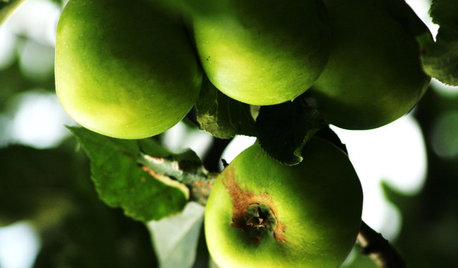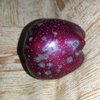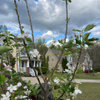Getting educated about apples that need to age before eating
Axel
13 years ago
Related Stories

KITCHEN DESIGN10 Ways to Design a Kitchen for Aging in Place
Design choices that prevent stooping, reaching and falling help keep the space safe and accessible as you get older
Full Story
PETSSo You're Thinking About Getting a Dog
Prepare yourself for the realities of training, cost and the impact that lovable pooch might have on your house
Full Story
LIFE3 Ways to Get Unstuck — About Organizing, Decorating, Whatever
Break out of the do-nothing rut to accomplish your goals, whether at home or in other parts of your life
Full Story
MOST POPULAR5 Ways to Pare Down Your Stuff — Before It Gets in the Door
Want to free up some room around the house? Rethink gift giving, give yourself a shopping mantra and just say, ‘No, thank you’ to freebies
Full Story
LIFESimple Pleasures: Get a Book Club Going
Kick back with friends and a thought-provoking read for an event that’s entertaining and educational all at once
Full Story
BATHROOM DESIGNRoom of the Day: Master Bath With an Educated Palette
A black and white color scheme and university-inspired decor earn high marks
Full Story
KIDS’ SPACESSee an Arizona Nursery That’ll Never Get Old
Age appropriate but not childish, this baby boy’s room will grow with him without a redesign
Full Story
EDIBLE GARDENSHow to Add an Apple Tree to Your Edible Garden
Readily available, beautiful and fragrant, apple trees offer four-season interest along with crisp, juicy fruit
Full Story
FUN HOUZZEverything I Need to Know About Decorating I Learned from Downton Abbey
Mind your manors with these 10 decorating tips from the PBS series, returning on January 5
Full Story
ORGANIZINGPre-Storage Checklist: 10 Questions to Ask Yourself Before You Store
Wait, stop. Do you really need to keep that item you’re about to put into storage?
Full Story







girlbug2
marknmt
Related Professionals
Fitchburg Landscape Architects & Landscape Designers · Towson Landscape Architects & Landscape Designers · Medford Landscape Contractors · Alpharetta Landscape Contractors · Apollo Beach Landscape Contractors · Bergenfield Landscape Contractors · Cornelius Landscape Contractors · East Chicago Landscape Contractors · Eustis Landscape Contractors · Hayden Landscape Contractors · Medford Landscape Contractors · Paramus Landscape Contractors · Riverview Landscape Contractors · Waipahu Landscape Contractors · Wheat Ridge Landscape Contractorsalan haigh
sautesmom Sacramento
marknmt
Michael
oregonwoodsmoke